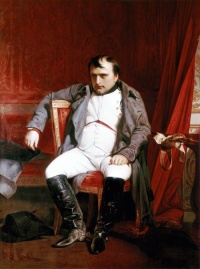Greatness
From The Art and Popular Culture Encyclopedia
| Revision as of 08:00, 14 December 2020 Jahsonic (Talk | contribs) ← Previous diff |
Revision as of 08:08, 14 December 2020 Jahsonic (Talk | contribs) Next diff → |
||
| Line 1: | Line 1: | ||
| - | [[Image:The Artist Moved by the Grandeur of Ancient Ruins.jpg|thumb|left|200px|''[[The artist's despair before the grandeur of ancient ruins]]'' (1778-79) by Henry Fuseli]] | + | [[Image:The Artist Moved by the Grandeur of Ancient Ruins.jpg|thumb|left|200px|''[[The Artist's Despair Before the Grandeur of Ancient Ruins]]'' (1778-79) by Henry Fuseli]] |
| {| class="toccolours" style="float: left; margin-left: 1em; margin-right: 2em; font-size: 85%; background:#c6dbf7; color:black; width:30em; max-width: 40%;" cellspacing="5" | {| class="toccolours" style="float: left; margin-left: 1em; margin-right: 2em; font-size: 85%; background:#c6dbf7; color:black; width:30em; max-width: 40%;" cellspacing="5" | ||
| | style="text-align: left;" | | | style="text-align: left;" | | ||
| - | "I am continuously in search of the relationship between [[critical acclaim]] and[[ mass popularity]]."--Sholem Stein | + | "[[I stand upon the shoulders of giants]]" |
| - | <hr> | + | |
| - | '[[Stephen David Ross]]'s ''[[A Theory of Art]]'' (1982) defines greatness simply as an enduring ability to generate further articulative responses. Because this ability can be produced by conditions of power, by genuine characteristics of the work, by historical accidents, or in any other number of other ways -- none of which are given priority -- and because articulative responses can include everything from references in coffee-table books to doctoral dissertations or further works of art, it seems an accurate description of what actually happens to works that have been granted special status by posterity." --Robert J. Belton [Aug 2006] | + | |
| |} | |} | ||
| [[Image:Napoléon Bonaparte abdicated in Fontainebleau.jpg|thumb|right|200px|''[[Napoléon Bonaparte abdicated in Fontainebleau]]'' (1845) by [[Paul Delaroche]]]] | [[Image:Napoléon Bonaparte abdicated in Fontainebleau.jpg|thumb|right|200px|''[[Napoléon Bonaparte abdicated in Fontainebleau]]'' (1845) by [[Paul Delaroche]]]] | ||
Revision as of 08:08, 14 December 2020

|
Related e |
|
Featured: |
Greatness is a concept that is heavily dependent on a person's perspective and biases. The term can be used to emphasize a thing's superiority. In Europe the most lauded rulers were given the attribute "the Great" (e.g. Catherine the Great).
Lists can be assembled of great people, things, and places. They can be formulated by panels of experts, polls, or an individual. Such lists are rarely definitive since they are subject to the opinion of the assembler.
According to Phillips Brooks and in reference to a person being "great," "greatness, in spite of its name, appears not to be so much a certain size as a certain quality in human lives It may be present in loves whose range is very small."
Greatest hits are collections of tracks released by music groups.
Lists of great things
- Seven Wonders of the World
- Western canon
- Great man theory
- Catherine the Great
See also


